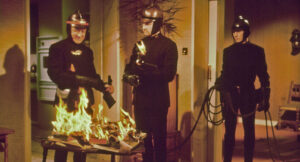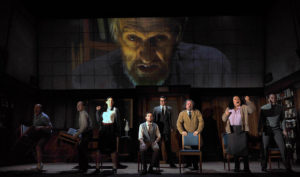It’s difficult to imagine this quiet bucolic corner of London being the point of origin of the defining dystopia of modern times. Yet, according to literary folklore, it was here in a Canonbury beer garden, in the shadow of a vast horse chestnut, that George Orwell first conceived the idea for 1984. The location would even make it chillingly into the novel: “Under the spreading chestnut tree, I sold you and you sold me…” Of course, this was a very different London, of ration books and bomb sites, and a recently widowed Orwell was already coughing up blood from the tuberculosis that would kill him. The future was, understandably, to be afraid of. Yet the seeds of 1984 originated decades earlier and over a thousand miles away, blowing in across the seas from what had been St Petersburg.
Despite themselves, censors point out which books are worth reading. The Soviet Union created a banned reading list that was second to none — Pasternak, Bulgakov, Akhmatova, Nabokov, even Orwell. The very first book condemned by the state’s own Ministry of Truth Glavlit was written by one of their own, the naval engineer and communist veteran Yevgeny Zamyatin.
The author had impeccable radical credentials. He was a shipbuilder, behind what would become the Lenin icebreaker. He’d taken part in the “whirlwind” 1905 Revolution and made it back from overseas at great risk to the very heart of the Bolshevik Revolution of 1917. Before that, he’d been imprisoned and exiled several times by the Tsarist regime, an experience that had made him a writer rather than breaking him. “If I have any place in Russian literature,” he admitted, “I owe it entirely to the Saint Petersburg Department of Secret Police”
The problem with Zamyatin, for the new regime, was twofold: he was a natural rebel and a mathematician. He had chosen his occupation through sheer belligerence, dedicating himself to the subject he had struggled with at school. And he knew enough of his trade to know that applying mathematical criteria and machine analogies — the abstraction of suffering, the delusion of perfectibility, utopian expediency — to humanity would have horrific consequences.
It might be thought that Zamyatin would have been free to speak and protected by his Old Bolshevik history. Yet Lenin’s communists showed early on they had little inhibitions about repressing those who’d built the revolution and in whose name the party supposedly ruled. They’d also no aversion to killing troublesome writers, executing the poet Nikolai Gumilev, for instance, under the fictitious guise of the Tagantsev conspiracy.
In such a climate, science fiction offered a tangential way of telling the truth, of demonstrating where the regime was heading, with a degree of plausible deniability. Though it would become an effective tool in the post-Stalin years, with the Brothers Strugatsky smuggling messianic questions past the censors in their astonishing alien visitation tale Roadside Picnic, it was an exceptionally dangerous gamble. Even the Bolshevik hero Mayakovsky found the sky came crashing down on him for tangentially criticising the new order in his futuristic plays The Bedbug and The Bathhouse. Zamyatin, however, was as headstrong as he was prescient. And so, a century ago, the novel We was born, a book that went on to directly or indirectly influence almost every dystopian book and film of the century to follow.
Set in 30th century AD, We takes place in a society that has aimed at and supposedly achieved perfection. This has occurred after the apocalyptic trauma of the Two Hundred Years War, which killed all but 0.2% of the population. In order to prevent conflict, any conflict — anything that differentiates or divides — has been minimised or excised, including identity, excellence, idiosyncrasy, even personality. The society is revealed to us via a curious ruse — part-diary and part-message to future extraterrestrials “to save them by force and teach them happiness”. It’s written by D503, a scientist who is leading the construction, not of an icebreaker but, a spaceship called Integral. He’s a kind of anti-Zamyatin who’s done well under the system and has little friction with it, until he meets the rebellious I-330. His emerging feelings for her threaten everything he believes in. Via the disruptive nature of love, he’s introduced to insurgents dedicated to overthrowing the One State, a chaotic world beyond the Green Wall, and the vertigo of freedom.
While dystopian novels such as The Iron Heel and The Sleeper Awakes pre-date We, as do the utopian texts they were upturning, so many dystopian tropes, from Logan’s Run to the Hunger Games, would first emerge here in then-innovative forms. Zamyatin noticed early on the Bolshevik obsession with “modernising” everything, in appearance, and satirised it throughout We. Russian institutions had their formerly archaic titles and heraldry discarded, to be replaced by acronyms, abbreviations and portmanteau (Gosplan, NKVD, Comintern, GULAG etc), which suggested dynamism. There was an ominous obsession too with productivity, alluded to in We with its 24-hour clock, “inspiring” 1984’s opening line: “It was a bright cold day in April, and the clocks were striking thirteen.”
Indeed, many aspects of We made it into 1984, albeit through the grimy prism of post-Blitz London. Surveillance is everywhere, though Zamyatin’s comes from glass buildings and listening devices rather than telescreens. While Orwell did draw attention to the novel in an essay for The Tribune, it’s telling that he covered his tracks by damning it with faint praise, labelling the novel as: “one of the literary curiosities of this book-burning age” and having the brass balls to imply that Brave New World plagiarised the book. Where We and 1984 differ is in mood and format. We has a strange avant-garde style that is reminiscent of the not-yet-annihilated Russian Futurist world of Vertov, Tatlin and co, whereas Orwell is more ashtrays and spam. One soars into oblivion, and one sinks.
All great dystopias of the future, the truism goes, are really about the now. Reversing 1948 to 1984, Orwell simply followed the threads of duplicity in contemporary rhetoric and the press, the horrors of ends justify the means in politics, the grotesque moral acrobatics required by any corruptible yet infallible orthodoxy. These things were all too evident after Stalin’s purges. How did Zamyatin know what would come to pass before it happened? Well, for one thing, he was not the first. The anarchist Mikhail Bakunin was scathing in his exchanges with Karl Marx — “the instinct of liberty is lacking in him; he remains from head to foot, an authoritarian” — and correctly foreboding as to where his gospel would lead. Zamyatin had the extra dimension of being an engineer and it might be surmised, in the tenor of our times, that he wrote of how technology corrupts us. But instead he showed how we corrupt technology and wield it against each other. He knew physics for sure, but he knew human nature even more.
The portents are dark in We. In Soviet terms, “the war between town and country” in the Two Hundred Years War prophecises the inferno of collectivisation and the Holodomor. The unease we might feel today reading We, however, is one of creeping recognition. He writes of the cult of productivity of Taylorism and how “he didn’t think of extending his method to the whole of life, to every step, to the entire day”, which predicts the unending hustle of today, wherein everything from sexuality to trauma is monetised and branded. In Zamyatin’s characters’ speech, we might see a particular contemporary condition; they continually preface what they are saying with ritualistic explanations and the performance of self-denunciation, which we see today in identitarian catechisms and, for example, land acknowledgements that do nothing to address injustice or land theft. Familiar mantras, internal censors, and in-group signalling is evident throughout the dialogue of We, despite being written a century ago.
We shows us that contemporary phenomena like cry-bullying, purity spirals and safe spaces are not uniquely contemporary, partly because they are simply secularised symptoms of faith. As JS Carr has noted, “The ideal of absolute mathematical order has become so ingrained in the mind of the protagonist… that he now feels actual oppression from that which stands in contrast to the One State’s teachings.” It might offer some comfort to know that the craven have always been with us. Zamyatin rightly points out that the victory of dogma over free expression results in “the entropy of thought”, and he rails against the overt politicisation of literature, which always ends in convention, if not outright servitude.
It takes love, or rather desire, to fuck up this wretched fabrication of utopia. In a world where everything is problematic and everyone, bar the administrators, is paralysed, the impulse to lust, to have, to possess becomes not just disruptive but revolutionary. Here we find another borrowing by Orwell. In both books, love is transgression and must be defiled and betrayed as it is a threat to the system. In the case of We: “Every number has the right to any other number as a sexual product”, and satisfaction is ticketed and approved by the state. It’s hard to read of this systemisation of sex without thinking of how it’s been commodified in our broken time by dating apps and deluges of porn, resulting not in mass libertinage, but younger generations having less sex than their predecessors.
One notable difference between We and 1984 comes with the fact that, in Orwell’s vision, tyranny is imposed whereas in Zamyatin’s vision it comes as a kind of relief. In this, the latter was more accurate. Zamyatin returns to the Matrix-like choice of Eden: “To live without illusion is to live without comfort, not all cut out for it, few can bear it, but great are those who can.” A wise judge of character, Zamyatin recognised that society was not cynical but infantilised, and most of us are not dissidents-in-waiting but rather responsibility dodgers. When he writes of “unfreedom” being “happiness”, Zamyatin is foreshadowing Orwell, but he is always looking back too, to the supposed Fall of Man from Paradise. His characters touch on this, damning Satan as the “bringer of dissonance, the teacher of doubt”, while his state develops an operation to surgically extract the imagination when it is scarcely necessary. He knows resistance is always a minority position, and yet everything depends on it.
What of those who ruled and benefited from this warped state of affairs? The abiding feeling by the end of We is fear and neurosis. We know enough about totalitarian history that any attempt to perfect human beings — the Übermensch or the Stakhanovite Homo Sovieticus — ends with inhuman monsters. Yet, the urge to perfect nevertheless continues, from our execrable managerial revolution, the misuse of AI, and the puritan deconstruction of all that’s historically and culturally flawed. Fear is rife in We and it trickles down from above.
Zamyatin would eventually escape the Soviet Union into exile, with the help of Maxim Gorky, and by sending a suicidally confrontational letter to Stalin, who, ever the capricious tyrant, let him go. He would find no peace in Paris, among the fallen aristocratic White émigré he despised. He remained a true rebel and therefore an exile even among the exiled. His imperfection was his making and undoing.
“To err is human” is not an excuse — it’s a foundation stone. Zamyatin, constructor of ships, knew that humans could not and should not be constructed: “Let the answers be wrong, let the philosophy be mistaken — errors are more valuable than truths: truth is of the machine, error is alive; truth reassures, error disturbs.” Disturbance keeps us real and honest, while certainty is deadening and antithetical to the human psyche.
Zamyatin pushes beyond the claustrophobia of dogma into panoramas, a writer who sees that our messiness, clamour, indignities and imperfections are the qualities that save us from ourselves as much as ethics and integrity. In a paradoxical sense, Zamyatin was that most despised and persecuted of Soviet figures, the wrecker, and he absolutely excelled in it. Consider all ideologies as echo-chambers or gated communities, where most of the work goes into maintaining the wall between belief and the encroaching reality outside. In We, the authorities admit “with that Wall we isolated the mechanical, perfect world from the irrational shapeless world of trees, birds, animals”. And there’s Zamyatin, 100 years later, prising open gaps in those walls, chipping away to let the chaos of truth in, like everything depends on it because everything does.
Disclaimer
Some of the posts we share are controversial and we do not necessarily agree with them in the whole extend. Sometimes we agree with the content or part of it but we do not agree with the narration or language. Nevertheless we find them somehow interesting, valuable and/or informative or we share them, because we strongly believe in freedom of speech, free press and journalism. We strongly encourage you to have a critical approach to all the content, do your own research and analysis to build your own opinion.
We would be glad to have your feedback.
Source: UnHerd Read the original article here: https://unherd.com/




